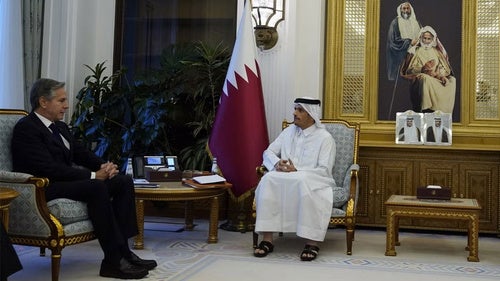What's Qatar's Role in the Israel-Hamas Negotiations?

Despite its small size, Qatar has historically played an outsize role in negotiating with organizations or countries that the U.S. doesn’t have relations with.
In short: Qatar, a small country in the Persian Gulf with “absurd” natural gas and oil wealth, told the U.S. it would discuss its relationship with Hamas. Despite its small size, Qatar has historically played an outsize role in negotiating with organizations or countries that the U.S. can't or won't deal with directly. Most recently, Qatar is helping to negotiate the release of hostages taken on Oct. 7 from Israel by Hamas.
Where is Qatar?
Qatar, which is four times the size of Rhode Island with a population roughly the size of Kansas, sits on the southwest coast of the Persian Gulf. It has a gross domestic product of $235.5 billion, or roughly $81,970 per person. In comparison, while the U.S.’ GDP is $26.95 trillion, its GDP per person is slightly less than Qatar’s, at $80,410.
Most of Qatar’s wealth comes from oil and natural gas, which “account for more than 70% of total government revenue, more than 60% of gross domestic product, and roughly 85% of export earnings.”
Qatar has used its wealth to bolster its international profile and military. When Qatar hosted the World Cup in 2022, it spent $220 billion on building stadiums, airports, hotels, a train system, and other infrastructure necessary to host the teams and the fans attending the event. In all, Qatar spent “15 times more than Russia did in 2018 as the previous hosts.”
Qatar also spends heavily on its military, spending more per person than any other country at $5,171 – doubling Israel, the second-largest spender.
What is the U.S.’s relationship with Qatar?
The U.S. and Qatar have what the U.S. calls a “strong” relationship, despite Qatar’s support of Hamas, cooperation with the Taliban government in Afghanistan, and past U.S. allegations that Qatar finances terrorist groups.
The two countries established a relationship in 1972, a year after Qatar became independent from the U.K. Qatar is now home to the U.S.’ largest military base in the Middle East, Al-Udeid Air Base, which can accommodate about 10,000 military personnel, the U.S. Air Forces Central Command, and four other command centers.
The U.S. is also “Qatar’s largest foreign direct investor,” owning $3.9 billion in Qatari stock in 2022. In 2019, Qatar announced plans to invest $45 billion in the U.S. These investments have included buying stakes in Washington state’s NHL, NBA, and WNBA teams. Qatar also sold 4.18 million barrels of oil to the U.S. between January and July 2023.
In March 2022, the U.S. officially designated Qatar a “major non-NATO” ally. Countries with this designation can receive U.S. military training and become reserves for U.S. military stockpiles.
Qatar also has often served as a middleman between the U.S. and countries or organizations the U.S. doesn’t have relations with. This fall, Qatar has helped negotiate the release of five Americans imprisoned in Iran and four Ukrainian children who had been taken to Russia.
What role is Qatar playing in Israeli hostage negotiations?
Qatar is once again a middleman, negotiating the release of over 200 hostages Hamas took from Israel on Oct. 7 – so far, four hostages have been released.
Qatar is in a unique position to negotiate. While maintaining strong relations with the U.S., it also has a close relationship with Hamas. A Qatari official told NBC News that Qatar gave $1.49 billion in aid to Gaza between 2012 and 2021. But NBC News also notes, “Experts, enemies and Western governments have questioned whether Hamas mingles the money for its military operations with money meant for civilian use.”
Qatar says the money – which is overseen by Israel and the United Nations – has not been used for unapproved reasons, including to support Hamas.
Qatar has “paid the salaries of civil servants in the Gaza Strip, provided direct cash transfers to poor families and offered other kinds of humanitarian aid to Palestinians in Gaza,” as part of past cease-fire agreements between Israel and Hamas, according to PBS.
Qatar lets an exiled Hamas leader operate an office in Doha, the Qatari capital.
“Qatar has a 360-degree foreign policy,” former CIA official and Middle East scholar Bruce Riedel told The Washington Post. “They host senior Hamas political officials. They provide the United States with a huge air base. They talk to the Iranians. They cover all their bases, so they can communicate with anybody at any time in a low-key fashion.”
After the Oct. 7 Hamas attack and Israeli siege on Gaza that ensued, Qatar released a statement saying Israel is “solely responsible for the ongoing escalation due to its continuous violations of the rights of the Palestinian people…”
But Qatar has said it will “revisit” its relationship with Hamas after the hostages are returned, according to The Washington Post.

